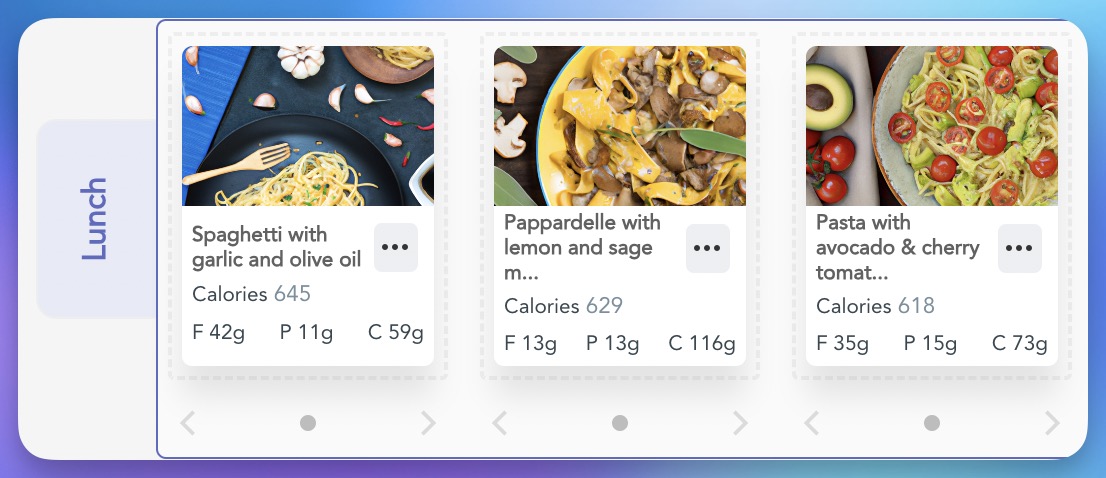Very Low Sodium Meal Plan
As a dedicated nutrition professional, you're well aware of the pivotal role that sodium management plays in heart health. The Very-Low Sodium 1800 kCal Plan is a specialized dietary template, meticulously designed to meet the stringent guideline of less than 1,500 mg of sodium per day. This plan prioritizes high-fiber, low-fat meals, providing your clients with the tools they need to embark on a heart-healthy journey.
What Is Sodium?
Sodium is an essential mineral that plays several crucial roles in the human body. It helps maintain fluid balance, regulates blood pressure, supports nerve function, and is essential for muscle contractions. Sodium is typically obtained through dietary sources, with common table salt (sodium chloride) being the most well-known. However, excessive sodium intake, often stemming from processed and high-sodium foods, can lead to health issues such as high blood pressure, heart disease, and kidney problems. Reducing sodium intake through dietary adjustments is a key strategy for promoting better health and preventing these conditions.
Meeting the Sodium Guideline
When it comes to sodium intake, health organizations provide clear guidance to promote heart health. The World Health Organization (WHO) recommends a daily sodium intake of 2,000 mg (2 grams), while the American Heart Association advocates for an even lower limit of 1,500 mg (1.5 grams) per day. These guidelines emphasize the critical role of sodium reduction in maintaining cardiovascular well-being.
The Very-Low Sodium 1800 kCal Plan is designed in alignment with these expert recommendations, offering a structured dietary approach to help individuals achieve this essential health goal.
The Quest for Less Sodium: Very-Low Sodium 1800 kCal Plan
Sodium, often found in table salt and many processed foods, can have detrimental effects on cardiovascular health when consumed in excess. By adhering to the Very-Low Sodium 1800 kCal Plan, you can assist your clients in significantly reducing their sodium intake, which offers a multitude of benefits:
1. Blood Pressure Control: Sodium plays a pivotal role in regulating blood pressure. By adhering to a very-low sodium diet, clients can effectively manage their blood pressure, reducing the risk of hypertension-related health issues.
2. Cardiovascular Risk Reduction: A diet low in sodium can significantly reduce the risk of heart disease and stroke, as it helps prevent the hardening and narrowing of arteries (atherosclerosis) and reduces the workload on the heart.
3. Kidney Health: Sodium can place a burden on the kidneys, especially in individuals with kidney issues. This plan supports kidney health by reducing the workload on these vital organs.
4. Lowered Risk of Edema: Edema, the swelling of body tissues caused by excess fluid retention, can be alleviated by reducing sodium intake. Clients who experience edema may find relief through a very-low sodium diet.
5. Improved Overall Well-Being: A very-low sodium diet encourages the consumption of whole, unprocessed foods, which can enhance overall well-being by providing essential nutrients and supporting healthy body functions.
Client-Centric Nutrition
While the Very-Low Sodium 1800 kCal Plan offers an outstanding foundation for heart health, remember that your clients' unique needs require personalized attention. Personalized meal plans should align with your clients' specific health goals, dietary preferences, and any medical conditions they may have. Always exercise your professional judgment and consult with interdisciplinary medical teams when implementing dietary changes.
Review and Edit Nutritionals: Before assigning this plan to your clients, review and edit nutritionals to ensure they best meet your clients' goals.
Consider the Whole Patient: It's vital to consider the complete picture of your client's health before prescribing a meal plan. Collaborate with your client's interdisciplinary medical team to confirm that any dietary changes align with their overall care plan.
Making a Significant Impact
The average American consumes excessive sodium, contributing to widespread health concerns. Reducing sodium intake by as little as 1,000 milligrams daily can have a profound impact on blood pressure and heart health. By using the Very-Low Sodium 1800 kCal Plan as a starting point, you can empower your clients to embrace healthier dietary choices, enhancing their quality of life and well-being. Your expertise as a nutrition professional, combined with this effective meal plan, serves as a powerful tool for improving the lives of those you serve.
People are also reading...
💪 Weight Loss Diet Meal Plan
🧃 Bariatric Diet Meal Plan
🧠 Brain Health Meal Plan
🏃 Carb-Cycling Meal Plan
🥬 Clean Keto Diet Meal Plan
🥛 Dairy Free Meal Plan
Ready to level-up?
Create meal plans 10x faster, follow up with your clients through our mobile app, and never struggle with meal planning or recipe management again.

